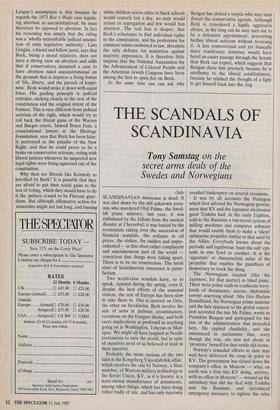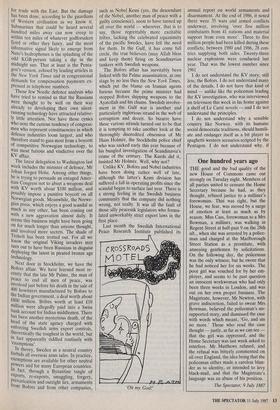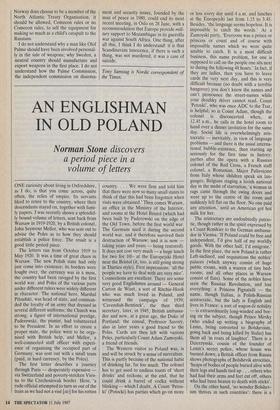THE SCANDALS OF SCANDINAVIA
Tony Samstag on the secret arms deals of the Swedes and Norwegians
Oslo SCANDINAVIAN innocence is dead. It was shot down by the still unknown assas- sins who murdered Olof Palme, the Swed- ish prime minister, last year; it was embalmed by the fallout from the nuclear disaster at Chernobyl; it was buried by the economists raking over the succession of financial scandals, the collapse in oil prices, the strikes, the sudden and unpre- cedented — in this often rather complacent and sanctimonious part of the world — conviction that things were falling apart. There is to be no resurrection. The latest state of Scandinavian innocence., is putre- faction.
Two world-class scandals have, so to speak, ripened during the spring: even if, despite the best efforts of the seasonal visitors, the rest of Europe has been slow to take them in. One is centred on Oslo, the other on Stockholm. Both involve the sale of arms in dubious circumstances, variations on the Irangate theme, and both carry implications as profound as anything going on in Washington, Teheran or Man- agua. We might all have laughed at Nordic pretensions to save the world, but in spite of ourselves most of us believed at least in their sincerity.
Probably the more curious of the two tales is the Kongsberg Vapenfabrikk affair, which involves the sale by Norway, a Nato member, of Western military technology to the Soviet Union. KV, as it is known, is a state-owned manufacturer of armaments, among other things, which has been doing rather badly of late, and has only narrowly avoided bankruptcy on several occasions.
It was by all accounts the Pentagon which first advised the Norwegian govern- ment that KV and the Japanese electronics giant Toshiba had, in the early Eighties, sold to the Russians a top-secret system of milling machines and computer software that would enable them to make a 'silent' submarine propeller similar to that used by the Allies. Everybody knows about the periodic and lugubrious 'hunt-the-sub' epi- sode in one fjord or another. It is the 'signature' or characteristic noise of the propeller that enables the guardians of democracy to track the thing.
The Norwegians reacted (like the Japanese, for that matter) in blind panic. There were police raids to confiscate lorry- loads of documents; arrests; diplomatic envoys scurrying about. Mrs Gro Harlem Brundtland, the Norwegian prime minister and the heir apparent to the global venera- tion accorded the late Mr Palme, wrote to President Reagan and apologised for the sins of the administration that preceded hers. He replied churlishly, and she announced in parliament that, sorry though she was, she was not about to 'prostrate' herself for that senile old clown.
Norway's remedial efforts to date may well have delivered the coup de grace to KV. The government has closed down the company's office in Moscow — what on earth was a firm like KV doing, anyway, with an office in Moscow? — wound up the subsidiary that did the deal with Toshiba and the Russians, and introduced emergency measures to tighten the rules for trade with the East. But the damage has been done, according to the guardians of Western civilisation as we know it. Submarines that could be heard several hundred miles away can now creep to Within ten miles of whatever godforsaken fjord or other they fancy, and the most informative signal likely to emerge from Nato's hydrophones is the splashing of the odd KGB-person taking a dip in the midnight sun. That at least is the Penta- gon's version, echoed by leading articles in the New York Times and in congressional demands for compensation payments ex-
pressed in telephone numbers. • Those few Nordic defence analysts who have tried to remind us that the Russians were thought to be well on their way already to developing their own silent- running technology have attracted relative- ly little attention. Nor have those cynics Who note the curious tendency of congress- men who represent constituencies inwhich defence industries loom largegt, and who therefore stand to gain most from a boycott of competitive Norwegian technology, to wax most furious and vindictive over the KV affair.
The latest delegation to Washington last week includes the minister of defence, Mr Johan Jorgen Hoist. Among other things, he is trying to persuade an enraged Amer- ican Congress not to abort a weapons deal With KV worth about $100 million, and Possibly impose a punitive boycott on all Norwegian goods. Meanwhile, the Norwe- gian press, which enjoys a good scandal as much as any other, has been coming out With a new aggravation almost daily. It seems this business might have been going on for much longer than anyone thought, and involved more secrets. The shade of Treholt has been trotted out. For all we know the original Viking invaders may turn out to have been Russians in disguise deploying the latest in pirated bronze age technology.
Next door in Stockholm, we have the Bofors affair. We have learned most re- cently that the late Mr Palme, the man of Peace to end all men of peace, was involved just before his death in the-sale of 400 howitzers manufactured by Bofors to the Indian government, a deal worth about 800 million. Bribes worth at least £10 million were allegedly paid into a Swiss bank account for Indian middlemen. There has been another mysterious death, of the head of the state agency charged with enforcing Swedish arms export controls. theoretically the toughest in the world, but in fact apparently riddled routinely with 'exemptions'.
In theory, Sweden as a neutral country forbids all overseas arms sales. In practice, exemptions are available for other neutral Powers and for many European Countries. In fact, through a Byzantine tangle of exports, re-exports, smuggling, forgery, Prevarication and outright lies, armaments from Bofors and from other companies,
such as Nobel Kemi (yes, the descendant of the Nobel, another man of peace with a guilty conscience), seem to have turned up all over the world — wherever, that is to say, those regrettably more excitable tribes, lacking the celebrated equanimity of the pacific Swedes, have felt the need for them. In the Gulf, it has come full circle, the true believers (may Allah bless and keep them) firing on Scandinavian tankers with Swedish weapons.
The Bofors affair has inevitably been linked with the Palme assassination, at one Stage by no less then the New York Times, which put the blame on Iranian agents furious because the prime minister had stopped Bofors shipping weapons to the Ayatollah and hi S chums. Swedish involve- ment in the Gulf war is another and particularly inglorious strand in the web of corruption and deceit. So bizarre have these various strands turned out to be that it is tempting to take another look at the thoroughly discredited obsession of Mr Hans Holrner, the Stockholm police chief who was sacked early this year because of his bungled investigation of Scandinavia's Crime of the century. The Kurds did it, insisted Mr Holmer. Well, why not?
Unlike KV, Bofors and Nobel industries have been doing rather well of late, although the latter's Kerni division has suffered a fall in operating profits since the scandal began to surface last year. There is a strong feeling in the Swedish business community that the company did nothing wrong, not really. It was all the fault of those silly peacenik legislators who formu- lated unworkably strict export laws in the first place.
Last month the Swedish International Peace Research Institute published its 'Oh my God!' annual report on world armaments and disarmament. At the end of 1986, it noted there were 35 wars and armed conflicts underway, involving 'over five million combatants from 41 nations and material support from even more'. Three to five million people had been killed duringthese conflicts; between 1980 and 1986, 28 con- tries supplying both sides. Twenty-three nuclear explosions were conducted last year. That was the lowest number since 1961 I do not understand the KV story; still less; the Bofors. I do not understand many of the details, I do not have that kind of mind — unlike like the policeman leading the KV investigation, who was interviewed on television this week in his home against a shelf of Le Cane novels — and I do not understand the principles.
I do not understand why a sensible country like Norway, with its humane social democratic traditions, should humili- ate and endanger itself as a bit player in spaghetti western scenarios scripted by the Pentagon. I do not understand why, if Norway does choose to be a member of the North Atlantic Treaty Organisation, it should be allowed, Comecon rules or no Comecon rules, to sell the equipment for making so much as a child's catapult to the Russians.
I do not understand why a man like Olof PaIme should have been involved personal- ly in the sale of weapons; why Sweden, a neutral country should manufacture and export weapons in the first place. I do not understand how the Palme Commission, the independent commission on disarma- ment and security issues, founded by the man of peace in 1980, could end its most recent meeting, in Oslo on 28 June, with a recommendation that Europe provide mili- tary support to Mozambique in its guerrilla war against South Africa. One thing, after all this, I think I do understand: it is that Scandinavian innocence, if there is such a thing, was not murdered, it was a case of suicide.
Tony Samstag is Nordic correspondent of the Times.




















































 Previous page
Previous page